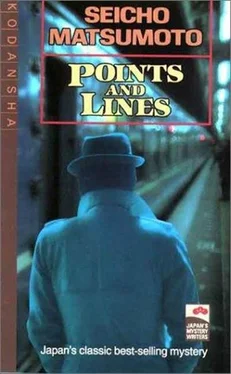Seichō Matsumoto - Points And Lines
Здесь есть возможность читать онлайн «Seichō Matsumoto - Points And Lines» весь текст электронной книги совершенно бесплатно (целиком полную версию без сокращений). В некоторых случаях можно слушать аудио, скачать через торрент в формате fb2 и присутствует краткое содержание. Жанр: Детектив, на английском языке. Описание произведения, (предисловие) а так же отзывы посетителей доступны на портале библиотеки ЛибКат.
- Название:Points And Lines
- Автор:
- Жанр:
- Год:неизвестен
- ISBN:нет данных
- Рейтинг книги:5 / 5. Голосов: 1
-
Избранное:Добавить в избранное
- Отзывы:
-
Ваша оценка:
- 100
- 1
- 2
- 3
- 4
- 5
Points And Lines: краткое содержание, описание и аннотация
Предлагаем к чтению аннотацию, описание, краткое содержание или предисловие (зависит от того, что написал сам автор книги «Points And Lines»). Если вы не нашли необходимую информацию о книге — напишите в комментариях, мы постараемся отыскать её.
Points And Lines — читать онлайн бесплатно полную книгу (весь текст) целиком
Ниже представлен текст книги, разбитый по страницам. Система сохранения места последней прочитанной страницы, позволяет с удобством читать онлайн бесплатно книгу «Points And Lines», без необходимости каждый раз заново искать на чём Вы остановились. Поставьте закладку, и сможете в любой момент перейти на страницу, на которой закончили чтение.
Интервал:
Закладка:
His wife was now sewing on a kimono. It had a bright red pattern and was intended for their daughter who was to be married soon. She was engrossed in her work.
"Rice!" he called to her, having finished the sake. She stopped sewing long enough to bring him the rice and then returned to her needlework. She continued to sew while waiting to serve him.
"Why don't you join me in a cup of tea?" suggested.
"Thank you, no." She was too busy even to look up.
Torigai looked at his wife intently over his bowl of rice. My wife is growing old, he decided. When a woman gets to be her age, she doesn't even want to take a cup of tea with her husband while he is having a late dinner. He nibbled on some pickles and sipped his tea.
His daughter's return interrupted his thoughts. Her face was radiant from the date with her fiance. "Where's Nitta?" her mother asked.
"He saw me to the door and left," the girl replied gaily. She took off her coat and sat down.
Torigai put aside the evening paper and looked at his daughter. "Sumiko, did you stop to have a cup of tea with Nitta after the movie?"
His daughter burst out laughing. "What a question, father! Of course we had tea."
"I see. Now, in that case…" He started to ask his daughter the question that was on his mind. "For instance, suppose Nitta was hungry and felt like eating, but you were not hungry and couldn't eat a thing?"
"That's a funny example."
"Now listen. Suppose Nitta said to you, 'All right, then, if you're not hungry spend the time window shopping while I get something to eat.' Would you do as you were told?"
"Well…" the girl hesitated, as if in thought. "I think I'd go to the restaurant with him. It wouldn't be fun to wait around alone."
"Just as I thought. You'd go with him even if you felt you couldn't take so much as a cup of tea?"
"Of course. I'd want to be with him. If I didn't feel like eating
I suppose I'd order coffee or something, just to keep him company."
Her father nodded in agreement. "Just as I thought," he repeated. He sounded so serious that his wife began to laugh. "What in the world are you asking that for?" she inquired.
"You keep quiet!" He raised his voice, still annoyed that she would not take tea with him while he was having his dinner.
"I suppose you feel you should stay with Nitta," he pursued, turning to his daughter.
"Well, I think it's a question of love rather than of appetite," she answered.
"Ah, I see." Very smart, he said to himself. His daughter had put into a single sentence his own rather vague thoughts. A question of love rather than of appetite: that was it exactly.
He was still pondering the term "one person" on the dining car receipt but had come to no conclusion. A man and a woman set out together on a long trip to Kyushu to commit suicide. Their love must be deeper than the ordinary love of two people for each other. They are on a train. Even if the woman is not hungry, it would be natural for her to accompany her lover to the dining car and take at least a cup of coffee with him. They had reserved seats, so even if they left together for another car, they need have no fear of losing their seats. Perhaps they were worried about their baggage and the woman had stayed behind to guard it? No, it could not be that. Torigai could not help but feel that there was something odd in the relationship between Sayama and Otoki.
Their behavior at Hakata was certainly strange. The woman left Sayama alone at the inn for five days and went off on her own. On the fifth night she telephoned him, and immediately after meeting they committed suicide. Nothing in Otoki's behavior had suggested suicide. There must be something more to the story, Torigai concluded. Yet, from whichever angle he looked at the case, the two bodies, laying side by side on the beach at Kashii, clearly pointed to suicide. His own eyes had confirmed it; there was no possible mistake. Well, perhaps I'm worrying about nothing at all, Torigai muttered to himself. But he still looked confused as he lit a cigarette.
The next morning three people arrived from Tokyo to claim the bodies. These were in the hospital morgue where the autopsies had been performed. Kenichi Sayama's claimant was his brother, a rather stout, dignified man with a mustache, in his early forties. To one of the policemen he presented his card which showed him to be the branch manager of a certain bank. For Otoki, an old woman of sixty odd years appeared and said she was her mother. She was accompanied by a smartly dressed young woman of about twenty-seven or -eight years of age. The younger woman gave her name as Tomiko, a waitress at a restaurant in Akasaka called Koyuki where Otoki had been employed. Thereupon, a disagreeable situation arose. The claimants for the two bodies ignored each other. They appeared together in the investigation room of the police station and at the waiting room of the hospital, but deliberately avoided each other. Actually, it was Sayama's brother, the branch bank manager, who was responsible for the strained atmosphere. He looked at the two women with obvious distaste and was cold and aloof throughout the formalities. It was as if he found the women disgusting, unclean. He kept them at a distance. They seemed afraid of him and acted nervous in his presence This was most apparent when the three were interrogated by the chief.
When asked, "Do you know what led them to commit suicide?" the banker answered rather coldly:
"I am most embarrassed by my brother's disgraceful action. The reasons for his death have been stated in the papers. I know nothing about the scandal at the ministry. Naturally, I would not know, either, whether he was trying to protect his superiors by taking his own life. The last time I saw him, which was about three weeks ago, he looked depressed. He was the reticent sort and never confided in me. He lost his wife three years ago and there has been talk of a second marriage. However, my brother did not seem too eager to enter into it and matters were not going smoothly. I learned for the first time from this incident that he had a mistress. He was a serious-minded young man and I was told by a close friend of his, just before I left Tokyo, that he was worried about his relations with this woman. What a fool he was! I wish he had talked to me about his problems. What I regret above all is that the woman was a waitress at a restaurant in Akasaka. I could understand it had she been a woman of a better class, but his choice is unpardonable. My brother had few affairs with women and I suppose was led astray by this one and was finally driven to suicide. Damn that woman! My brother had such a bright future and she ruined him." He seemed to want to transfer his bitterness to Otoki's relatives. He not only refused to speak to them but seemed ready to call them names and even to strike them. He might well have done something of the sort if there had been no one around and he could forget appearances.
Otoki's mother was next to be questioned.
"Otoki's real name is Hideko Kuwayama. We are from Akita and have been farmers for generations. She was married once but was not fortunate in her choice, and after she and her husband separated she began working in Tokyo. Before being employed at the Koyuki she worked at two or three other restaurants, but since she wrote home very seldom, I really know little about the life she led. I was concerned about her, but I have five children at home and therefore no time to worry much about any one of them. I hurried here as soon as I received the wire from the Koyuki Restaurant. I am heartbroken for the poor child." This was not said all in one breath; she spoke brokenly, holding back her tears. Her face was deeply lined for one of her age and the rims of her eyelids were red, as if inflamed.
She was followed by Tomiko, the waitress from the Koyuki.
Читать дальшеИнтервал:
Закладка:
Похожие книги на «Points And Lines»
Представляем Вашему вниманию похожие книги на «Points And Lines» списком для выбора. Мы отобрали схожую по названию и смыслу литературу в надежде предоставить читателям больше вариантов отыскать новые, интересные, ещё непрочитанные произведения.
Обсуждение, отзывы о книге «Points And Lines» и просто собственные мнения читателей. Оставьте ваши комментарии, напишите, что Вы думаете о произведении, его смысле или главных героях. Укажите что конкретно понравилось, а что нет, и почему Вы так считаете.












